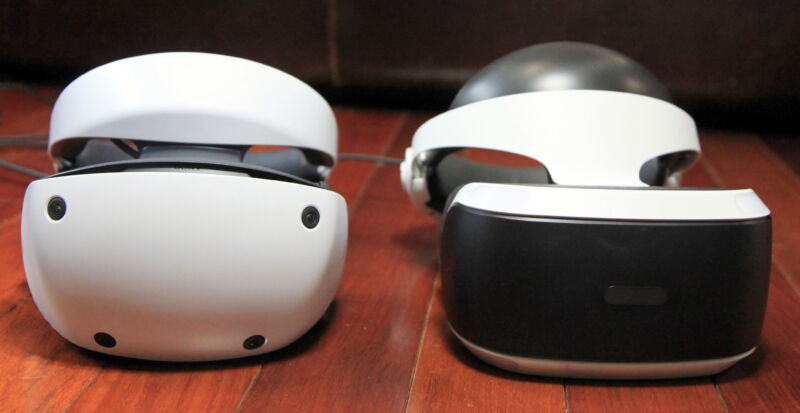
Bloomberg cites "people familiar with [Sony's] plans" in reporting that PSVR2 sales have "slowed progressively" since its February 2023 launch. Sony has produced "well over 2 million" units of the headset, compared to what tracking firm IDC estimates as just 1.69 million unit shipments to retailers through the end of last year. The discrepancy has caused a "surplus of assembled devices... throughout Sony’s supply chain," according to Bloomberg's sources.
IDC estimates a quarterly low of 325,000 PSVR2 units shipped in the usually hot holiday season, compared to a full 1.3 million estimated holiday shipments for Meta's then-new Quest 3 headset, which combined with other Quest products to account for over 3.7 million estimated sales for the full year.
The last of the tethered headsets?
The reported state of affairs for PSVR2 is a big change from the late 2010s when the original PlayStation VR became one of the bestselling early VR headsets simply by selling to the small, VR-curious slice of PS4 owners. At the time, the original PSVR was one of the cheapest "all-in" entry points for the nascent market of tethered VR headsets, in large part because it didn't require a connection to an expensive, high-end gaming PC.In the intervening years, though, the VR headset market has almost completely migrated to untethered headsets, which allow for freer movement and eliminate the need to purchase and stay near external hardware. The $550 PlayStation VR2 is also pricier than the $500 Meta Quest 3 headset, even before you add in the $500 asking price for a needed PS5. Sony's new headset also isn't backward compatible with games designed for the original PSVR, forcing potential upgraders to abandon most of their existing VR game libraries for the new platform.
Even before the PSVR2 launched, Sony was reportedly scaling back its ambitions for the headset (though the company denied those reports at the time and said it was "seeing enthusiasm from PlayStation fans"). And since its launch, PSVR2 has suffered from a lack of exclusive titles, featuring a lineup mostly composed of warmed-over ports long available on other headsets. An Inverse report from late last year shared a series of damning complaints from developers who have struggled to get their games to run well on the new hardware.
Put it all together, and PSVR2 seems like a too-little-too-late upgrade that has largely squandered the company's early lead in the space. We wouldn't be shocked if this spells the end of the line for Sony's VR hardware plans and for mass-market tethered headsets in general.
Promoted Comments